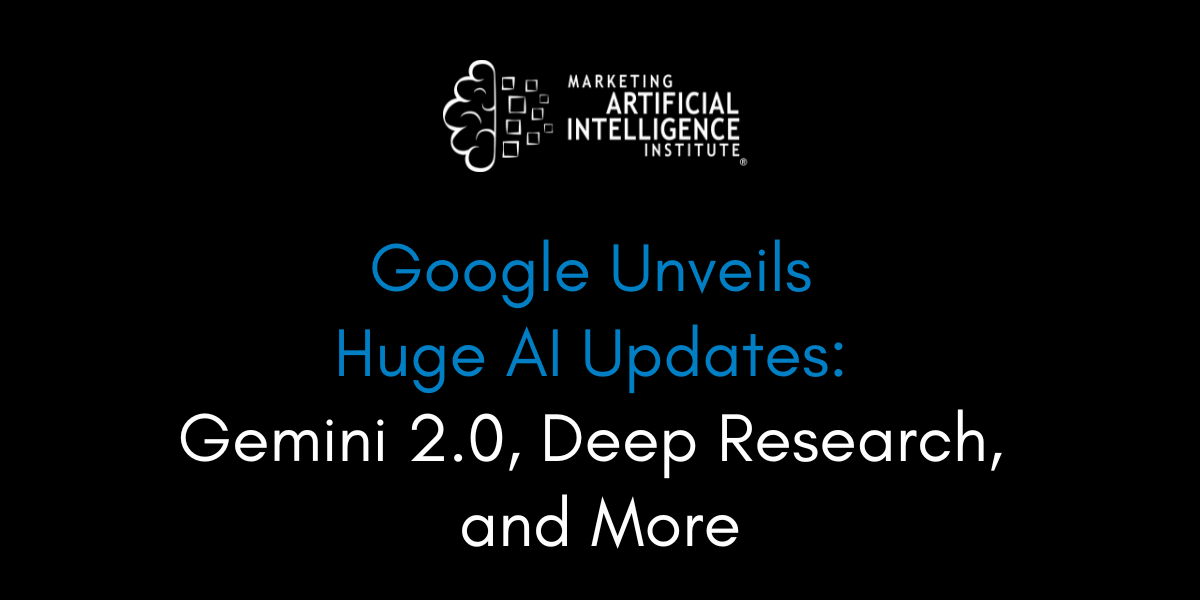Google just fired back at OpenAI’s 12 Days of OpenAI event with a series of major AI announcements that could fundamentally change how we work and do research.
The announcements include a new version of Gemini, a powerful research tool, and an AI that can control your web browser. But one feature in particular is turning heads in the AI world.
I broke down everything you need to know about Gemini 2.0 and Google’s other big releases on Episode 127 of The Artificial Intelligence Show with Marketing AI Institute founder/CEO Paul Roetzer.
Gemini 2.0
First up, Google unveiled Gemini 2.0, which they’re calling their “new AI model for the agentic era.” Right now, the only model from the Gemini 2.0 family that’s available is Gemini 2.0 Flash, their fast, developer-focused model. But the update signals where Google is headed.
“I think it’s a really big deal and it’s starting to show where their models are going,” says Roetzer.
Every frontier model company is following the same approach as Google: building fully multimodal models from the ground up that are trained on multimodal data.
Roetzer’s best guess as to when we will get the full Gemini 2.0 model is in April 2025, when Google has its next big developer conference.
“I don’t know we’re going to get the full thing for a little while here, but what they’ve released is already powerful.”
Deep Research in Gemini
Another announcement from Google is also turning heads. In Gemini 1.5 Pro, you can now access a feature called Deep Research—and it’s truly impressive.
Deep Research is a super-powerful AI research assistant that creates multi-step research plans, analyzes information from across the web, and compiles comprehensive reports on complex topics—using literally dozens or hundreds of webpages.
"Deep Research was one of those’ wow’ moments,” says Roetzer. You enter a prompt into the tool, telling it what you want to research. It creates a multi-step research plan, which you tweak or approve. And then it takes a few minutes to do all the research for you by analyzing dozens or hundreds of websites.
The end result is a well-sourced research brief on the topic you were interested in. And the research is so robust that Roetzer found himself immediately saving tons of time on mission-critical work.
“I put a very simple prompt in and it went and in about three to five minutes completed a research project that would have taken me easily three to five hours,” he says.
Deep Research analyzed for him over 100 different web sources related to pricing strategies for new products. It then turned all of this analysis into a comprehensive research brief stored in a Google Doc.
"It takes a few minutes. It goes and browses the web. It does the searching, the finding. It looks for interesting pieces of information and it keeps repeating that process until you get the final product,” he says.
The sheer firepower that Deep Research brings to the table opens up so many new possibilities, says Roetzer.
“This changes things. It’s different than anything else we had. It’s different than what ChatGPT can do. It’s different than what Perplexity is doing. We’re already thinking about how to use it in research, publishing, and education.”
Project Mariner: The Future of Web Browsing?
Last but certainly not least: Google also unveiled Project Mariner, a research prototype that can take control of your Chrome browser—moving the cursor, clicking buttons, filling out forms, and navigating websites.
This is another stunning example of AI now being able to use computers. While companies have been working on this for years, we’re finally starting to see real progress, says Roetzer.
“The breakthroughs are happening now,” he says.
But as exciting as the technology is, it also comes with risks.
“Computer use is a really risky endeavor," says Roetzer, citing serious cybersecurity risks with AI tools that can take actions on your machine without your direct involvement.
"There's lots that has to be solved by these companies before you can roll this out at mass market scale.”
Mike Kaput
As Chief Content Officer, Mike Kaput uses content marketing, marketing strategy, and marketing technology to grow and scale traffic, leads, and revenue for Marketing AI Institute. Mike is the co-author of Marketing Artificial Intelligence: AI, Marketing and the Future of Business (Matt Holt Books, 2022). See Mike's full bio.



